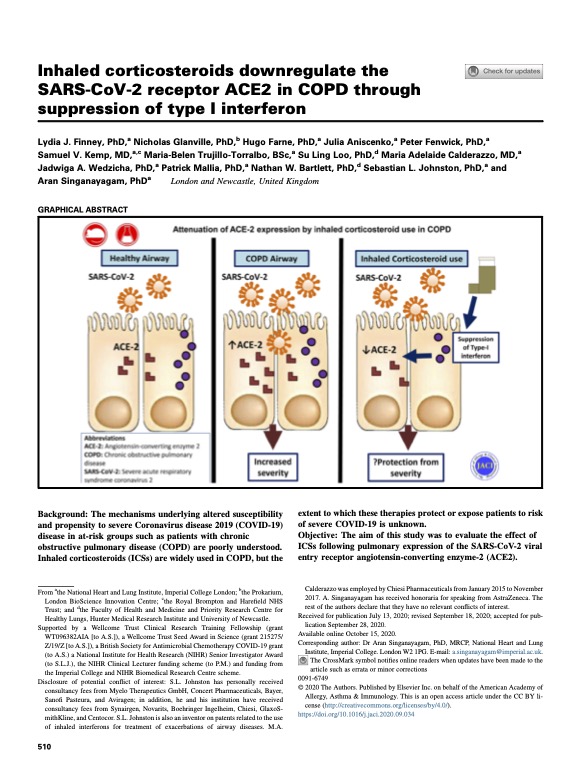LJ Finney
Inhaled corticosteroids downregulate the SARS-CoV-2 receptor ACE2 in COPD through suppression of type I interferon
Finney, LJ; Glanville, N; Farne, H; Aniscenko, J; Fenwick, P; Kemp, SV; Trujillo-Torralbo, MB; Loo, SL; Calderazzo, MA; Wedzicha, JA; Mallia, P; Bartlett, NW; Johnston, SL; Singanayagam, A
Authors
N Glanville
H Farne
J Aniscenko
P Fenwick
SV Kemp
MB Trujillo-Torralbo
SL Loo
MA Calderazzo
JA Wedzicha
P Mallia
NW Bartlett
SL Johnston
A Singanayagam
Abstract
Background: The mechanisms underlying altered susceptibility and propensity to severe Coronavirus disease 2019 (COVID-19) disease in at-risk groups such as patients with chronic obstructive pulmonary disease (COPD) are poorly understood. Inhaled corticosteroids (ICSs) are widely used in COPD, but the extent to which these therapies protect or expose patients to risk of severe COVID-19 is unknown. Objective: The aim of this study was to evaluate the effect of ICSs following pulmonary expression of the SARS-CoV-2 viral entry receptor angiotensin-converting enzyme-2 (ACE2). Methods: We evaluated the effect of ICS administration on pulmonary ACE2 expression in vitro in human airway epithelial cell cultures and in vivo in mouse models of ICS administration. Mice deficient in the type I IFN-a/b receptor (Ifnar12/2) and administration of exogenous IFN-b were used to study the functional role of type-I interferon signaling in ACE2 expression. We compared sputum ACE2 expression in patients with COPD stratified according to use or nonuse of ICS. Results: ICS administration attenuated ACE2 expression in mice, an effect that was reversed by exogenous IFN-b administration, and Ifnar12/2 mice had reduced ACE2 expression, indicating that type I interferon contributes mechanistically to this effect. ICS administration attenuated expression of ACE2 in airway epithelial cell cultures from patients with COPD and in mice with elastase-induced COPDlike changes. Compared with ICS nonusers, patients with COPD who were taking ICSs also had reduced sputum expression of ACE2. Conclusion: ICS therapies in COPD reduce expression of the SARS-CoV-2 entry receptor ACE2. This effect may thus contribute to altered susceptibility to COVID-19 in patients with COPD.
Citation
Finney, L., Glanville, N., Farne, H., Aniscenko, J., Fenwick, P., Kemp, S., Trujillo-Torralbo, M., Loo, S., Calderazzo, M., Wedzicha, J., Mallia, P., Bartlett, N., Johnston, S., & Singanayagam, A. (2021). Inhaled corticosteroids downregulate the SARS-CoV-2 receptor ACE2 in COPD through suppression of type I interferon. Journal of Allergy and Clinical Immunology, 147(2), 510-+. https://doi.org/10.1016/j.jaci.2020.09.034
| Journal Article Type | Article |
|---|---|
| Acceptance Date | Sep 28, 2020 |
| Publication Date | 2021 |
| Deposit Date | Jan 5, 2022 |
| Publicly Available Date | Jan 5, 2022 |
| Print ISSN | 0091-6749 |
| Publisher | Elsevier |
| Peer Reviewed | Peer Reviewed |
| Volume | 147 |
| Issue | 2 |
| Pages | 510-+ |
| DOI | https://doi.org/10.1016/j.jaci.2020.09.034 |
| Keywords | COPD; COVID-19; inhaled corticosteroids; viral infection; PULMONARY-DISEASE; FLUTICASONE; PROPIONATE; EXPRESSION; IMMUNITY; MODEL |
| Public URL | https://rvc-repository.worktribe.com/output/1554193 |
Files
OA
(152 Kb)
Image
Publisher Licence URL
http://creativecommons.org/licenses/by/4.0/
Downloadable Citations
About RVC Repository
Administrator e-mail: publicationsrepos@rvc.ac.uk
This application uses the following open-source libraries:
SheetJS Community Edition
Apache License Version 2.0 (http://www.apache.org/licenses/)
PDF.js
Apache License Version 2.0 (http://www.apache.org/licenses/)
Font Awesome
SIL OFL 1.1 (http://scripts.sil.org/OFL)
MIT License (http://opensource.org/licenses/mit-license.html)
CC BY 3.0 ( http://creativecommons.org/licenses/by/3.0/)
Powered by Worktribe © 2025
Advanced Search

